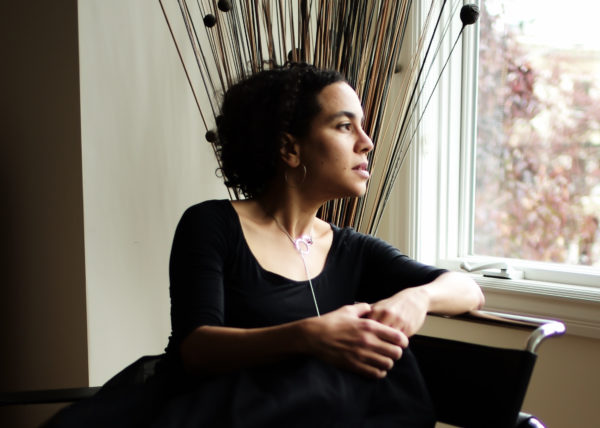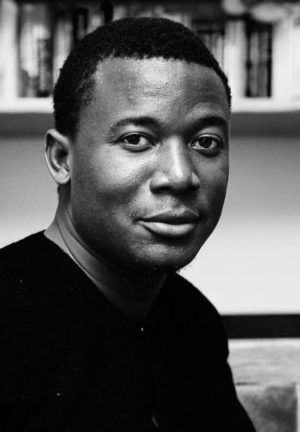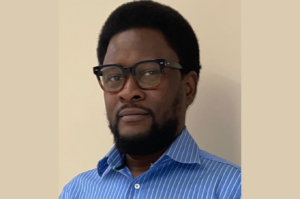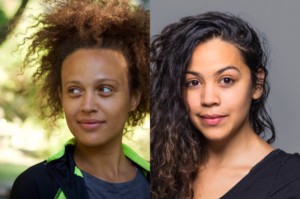
Sarah Ládípọ̀ Manyika is a Nigerian writer of note, with essays, academic papers, reviews, short stories, two well-received novels to her name: In Dependence (Legend Press, 2008; Cassava Republic, 2009) and Like a Mule Bringing Ice Cream to the Sun (Cassava Republic, 2017). The former is currently on the JAMB syllabus across Nigeria while the latter became the first by an African to be shortlisted for the Goldsmiths Prize.
Manyika has been unapologetic about her desire to improve the African publishing space by putting her intellectual property outputs in the hands of African publishers. She wrote about that intention in her March 2016 essay for Brittle Paper. And of her style, the writer Yẹ́misí Aríbisálà had said: “I am grateful for the simple integrity of Ladipo Manyika’s story that does not patronize the reader, and the smoothness and confidence of her prose.”
I first “met” her in 2015 when her publishers organized a multilingual and multimedia anthology of love stories called the Ankara Press Valentine Anthology, which featured short love stories that were translated into different African languages and voiced by other African writers. I have followed her career since, which got another important boost when her conversation with Toni Morrison was published, in June 2017, in Granta. I’d always wanted to talk to her about it and other matters. The following is the result of that conversation.
***
INTERVIEWER
How long have you lived in San Francisco ?
S. L. MANYIKA
It’s been twenty years which is the longest that I’ve lived in any one city.
INTERVIEWER
That’s a long time. Did you choose the city or did it choose you?
S. L. MANYIKA
I moved to San Francisco with my husband. Neither of us expected to live here for so long, but here we are. I like to think we chose the city and it chose us. For the time being.
INTERVIEWER
I’ve always been interested in the theme of displacement and/or movement, which is perhaps what drew me to your latest novel: the story of an elderly Yorùbá woman in San Francisco. Of what value to the writing process, or to your own literary delight, is the idea of a character whose story unfolds in an environment far away from where she’d always been most comfortable?
S. L. MANYIKA
I, like you, am interested in themes of displacement and movement — both physical (in a world in which borders are becoming increasingly difficult to cross for some, and more porous for others) as well as displacements that are psychological. Diasporas are interesting spaces for me, and with Moráyọ̀ I was particularly drawn to explore the life of someone growing old in a place and culture far from where they grew up. I was also interested in what it means to create, sometimes anew, a sense of self in different places at different stages of life. Notions of displacement and comfort are also of relevance to the writer. I, for one, frequently write from a place of restlessness.
INTERVIEWER
When/How did the character of Moráyọ̀ come to you?
S. L. MANYIKA
My fiction is often driven by a desire to read stories that I cannot find. The character of Moráyọ̀ and her story is no exception. In life, I meet many older women who have lived colorful lives, and yet when it comes to fiction I don’t find many stories that mirror this, especially so when it comes to the lives of black women. And so, not finding these stories, I felt compelled to try writing one such story myself.
INTERVIEWER
What have you been up to since the book was published?
S. L. MANYIKA
With the release of the new book I’ve been busy with a number of book-related events and have only just begun some new writing. A third novel is simmering while I write some shorter pieces and devour many new works including Ayọ̀bámi Adébáyọ̀’s Stay With Me, and David Grossman’s A Horse Walks into a Bar.
INTERVIEWER
What informed the book’s multiple narrators?
S. L. MANYIKA
I think it’s hard to pinpoint what informs a book’s style, but I do know that with this book I was eager to dive deeper with language. I wanted my character’s voices to jump off the page and for a reader to really hear the voices in every sense. I began the book in the third person, but it didn’t take long for my characters, many of them invisible to society at large, to insist on having their own voice.
INTERVIEWER
Any particular pleasure in creating a sophisticated elderly Yorùbá character living in San Francisco?
S. L. MANYIKA
Let me start by saying that I’m taking great pleasure in seeing Yorùbá names given their due accents in this piece. I take pleasure in all of my characters and especially characters such as Moráyọ̀ who haven’t previously featured much in literature. It goes back to what I was saying earlier about being eager to see characters and stories that I haven’t found elsewhere.
INTERVIEWER
Have the audience reaction to the character and the book in general been positive?
S. L. MANYIKA
There have been a number of wonderful surprises. One happened yesterday when I received a note via Goodreads from a woman in her 70s who has started an intergenerational reading group. She wrote to tell me that she’s using Like a Mule Bringing Ice Cream to the Sun as the group’s first read. I love the sound of an intergenerational reading group and I am of course delighted that they’ve chosen my book.
INTERVIEWER
What was your biggest takeaway from interviewing Toni Morrison?
S. L. MANYIKA
Meeting with Toni Morrison was the literary highlight of my year which is why I had to write an essay* about it — there is so much to say! What struck me the most about meeting her was her warmth, her generosity and her sense of humor. She was the greatest inspiration behind my last novel and will likely remain so for the next novel too.
*The essay, entitled On Meeting Toni Morrison will be published in October in Transition issue 124. This issue honors the memory of scholar and friend, Professor Abiola Irele which makes it particularly special for me.
INTERVIEWER
Is there any other living (or deceased) writer you’d have loved to interview?
S. L. MANYIKA
I feel very lucky to have interviewed many great authors already and what I’d really like to do is to interview these authors again, perhaps over a period of several years. It feels greedy to be wishing to interview even more, but because you’re asking… I would have loved to have interviewed Zora Neale Hurston, James Baldwin, Lorraine Hansbury, John Berger, Tillie Olsen and Buchi Emecheta. I’d like to interview Barack Obama, Zadie Smith, Ben Judah, Edna O’Brien, Edwidge Danticat, David Grossman, Nnedi Okorafor… the list is endless.
INTERVIEWER
What types of books inspire you to write?
S. L. MANYIKA
Almost all books inspire me to write. A good book makes me want to write better and a bad book makes me want to write better too. I’m inspired not just by books but by other forms of writing and storytelling. I was so impressed, for example, by Rachel Kaadzi Ghansah’s profile piece on Toni Morrison written for The New York Times a few years ago, that this was my guide and inspiration as I tried to write my own essay on meeting Toni Morrison.
INTERVIEWER
And if you could choose, who would be your favourite fictional character?
S. L. MANYIKA
My favorite fictional character is always the character that I’m trying to write. It has to be, otherwise I’d quickly lose interest in writing about them.
INTERVIEWER
What more could be done to encourage reading and writing on the continent?
S. L. MANYIKA
Good stories naturally encourage reading and writing so I think the key to encouraging more people to read and write is to provide for a variety of stories in readily accessible forms. This way every reader and potential writer stands a greater chance of finding a story that they find personally compelling.
INTERVIEWER
Who are your favourite contemporary writers?
S. L. MANYIKA
It’s an ever expanding and evolving list. I’m currently enjoying Grossman, Aríbisálà, and Morrison and Poetry Magazine introduces me to many great poets each month.
INTERVIEWER
What characteristic most endears you to a creative work?
S. L. MANYIKA
It’s something that the actor and playwright Anna Deveare Smith describes as “presence” – you know it when you see/hear it.
INTERVIEWER
What type of book are you currently working on or do you wish you could write?
S. L. MANYIKA
I’m working on two books at the moment – a collection of essays and a new novel. At the beginning of each new novel I think wistfully of the fairy tale of the elves and the shoemaker. I fantasize about waking up one day to magically find a completed manuscript on my desk. I have the same fantasy, when it comes to cleaning my house, doing the laundry, responding to email …
INTERVIEWER
Do you remember how you got into creative writing? What advice will you give your teenage self?
S. L. MANYIKA
I come to fiction and to creative non-fiction both out of a desire to write stories that I’m not finding and a desire to work through ideas that I’m either wrestling with or trying to understand better. As for my teenage self, I’m not altogether sure it’s a thing of the past so I’d say to her what I continue to say to her older self today—fear less, question more, laugh more, and don’t be afraid to make mistakes. How else does one learn and grow without making mistakes?
___
Photo credit: James Manyika
****************
About the Interviewer:
 Kọ́lá Túbọ̀sún’s work has appeared in Aké Review, Brittle Paper, International Literary Quarterly, Maple Tree Literary Supplement, and recently in Literary Wonderlands, an anthology edited by Laura Miller. He is the winner of the Premio Ostana “Special Prize” 2016 (awarded in Ostana, Cuneo, Italy) for his work in indigenous language advocacy.
Kọ́lá Túbọ̀sún’s work has appeared in Aké Review, Brittle Paper, International Literary Quarterly, Maple Tree Literary Supplement, and recently in Literary Wonderlands, an anthology edited by Laura Miller. He is the winner of the Premio Ostana “Special Prize” 2016 (awarded in Ostana, Cuneo, Italy) for his work in indigenous language advocacy.









My Books of 2017 « ktravula – a travelogue! December 09, 2017 08:38
[…] I published a number of reviews and interviews on Brittle Paper this year, of works of writers like Sarah Ládípọ̀ Manyika, Ngugi wa Thiong’o, Níyì Ọ̀ṣúndáre, Chibundu Onuzor, Odafe Atógun, Lauren Beukes, […]